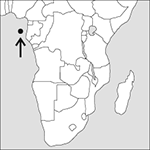
Source: MAPS IN MINUTES™ © RH Publications (1997)
Capital:
São Tomé
Area:
964 sq km (372 sq miles)
Population:
186,817 (2013 est)
Currency:
1 dobra = 100 centimos
Religions:
Roman Catholic 55.7%; Adventist 4.1%; Assembly of God 3.4%
Ethnic Groups:
Mixed; African; European
Languages:
Portuguese (official); Forro; minority languages
International Organizations:
UN; AU; Non-Aligned Movement
A country comprising two islands and several islets, lying on the Equator in the Gulf of Guinea, off the coast of West Africa.
Physical
The two main islands are volcanic and both have coastal lowlands rising to central mountainous regions. The island of Principe lies about 144 km (90 miles) north of São Tomé. Tropical rainforests cover most of the islands.
Economy
São Tomé and Príncipe is a very poor country with most of the population engaged in subsistence agriculture and two-thirds living in poverty. Cocoa accounts for around two-thirds of exports, followed by copra, coffee, and palm oil. The second-largest source of foreign exchange is licences from foreign vessels, mostly from the EU, fishing for tuna. Tourism is expanding but no commercial finds have yet been made in offshore oil fields being developed jointly with Nigeria.
History
The islands were probably uninhabited when they were discovered by the Portuguese in 1471; they were settled from 1493 and annexed by Portugal in 1522. Independence was gained in 1975 with Manuel Pinto da Costa as President (1975–91). Multiparty democracy was instituted under a new constitution in 1990. In 1995 President Miguel Trovoada was deposed by Cuban-trained rebel forces but was swiftly restored to power. Tensions continued for the rest of Trovoada’s presidency and into that of his successor, Fradique de Menezes, who was elected in 2001 and re-elected in 2006. A coup in 2003 ended in a compromise between rebels and the de Menezes regime. Pinto da Costa was re-elected President in 2011; he was replaced by Evaristo Carvalho of Independent Democratic Action (ADI) in July 2016. Patrice Trovoada, a former president’s son, has been Prime Minister since 2014, when the ADI convincingly won a parliamentary election.
- fiard
- fiat money
- Fibiger, Johannes Andreas Grib
- Fibonacci (1170–1250)
- Fibonacci, Leonardo
- Fibonacci multiplication
- Fibonacci number
- Fibonacci search
- Fibonacci series
- fibratus
- fibre
- Fibre Channel
- Fibre Distributed Data Interface
- fibre distributed data interface
- fibre media
- fibre optic cable
- fibre optic gyroscope
- fibre optics
- fibre-optics system
- fibre to the curb
- fibre to the home
- fibretronics
- fibril
- fibrille
- fibrin